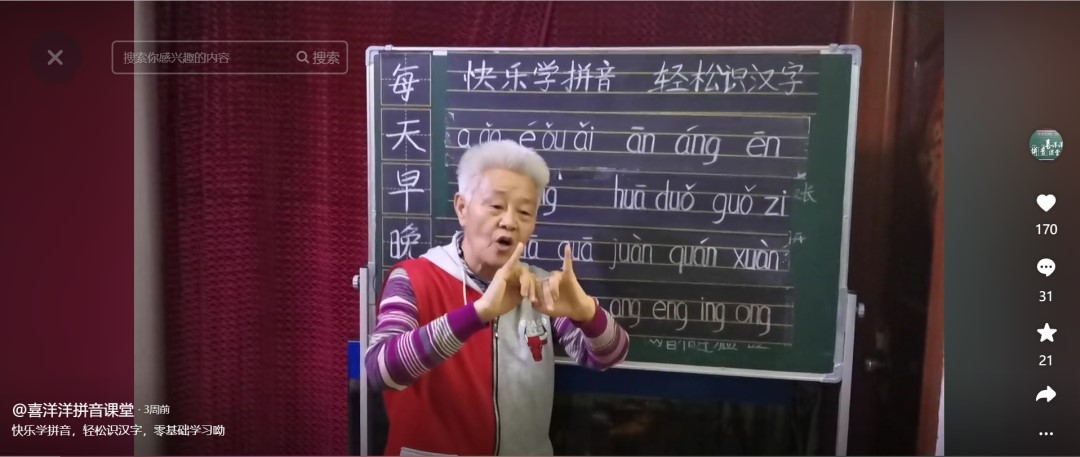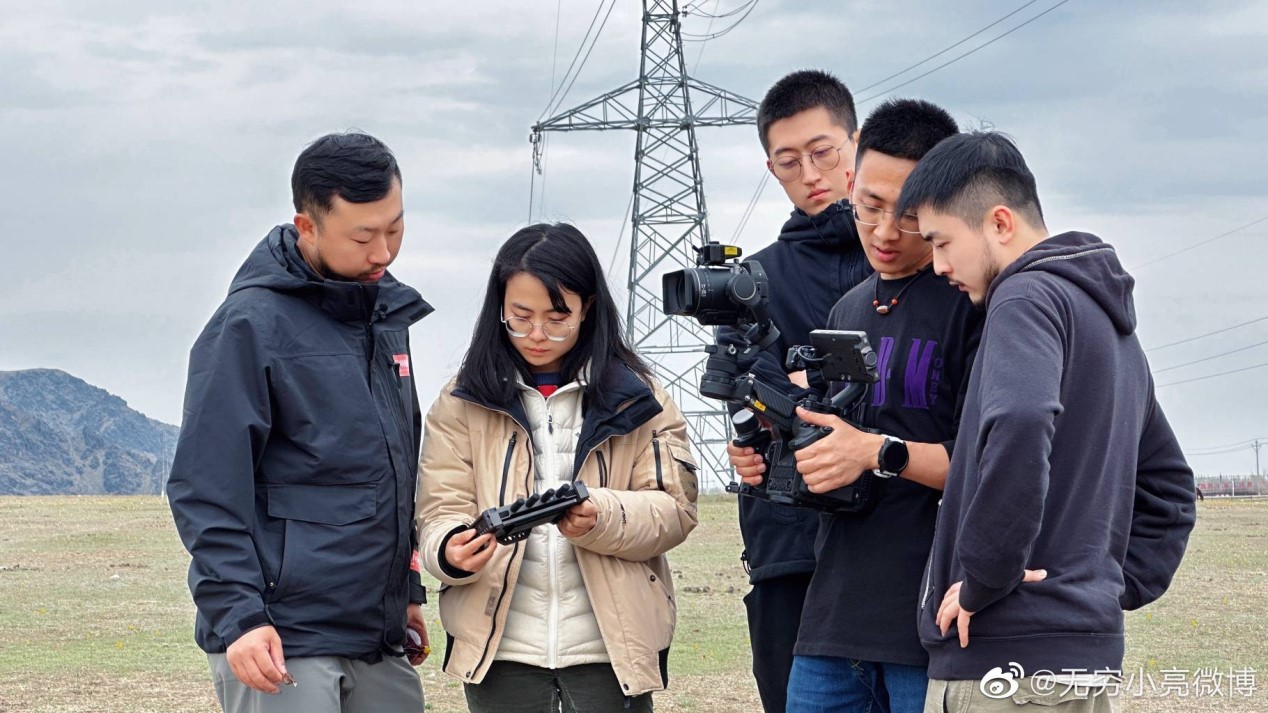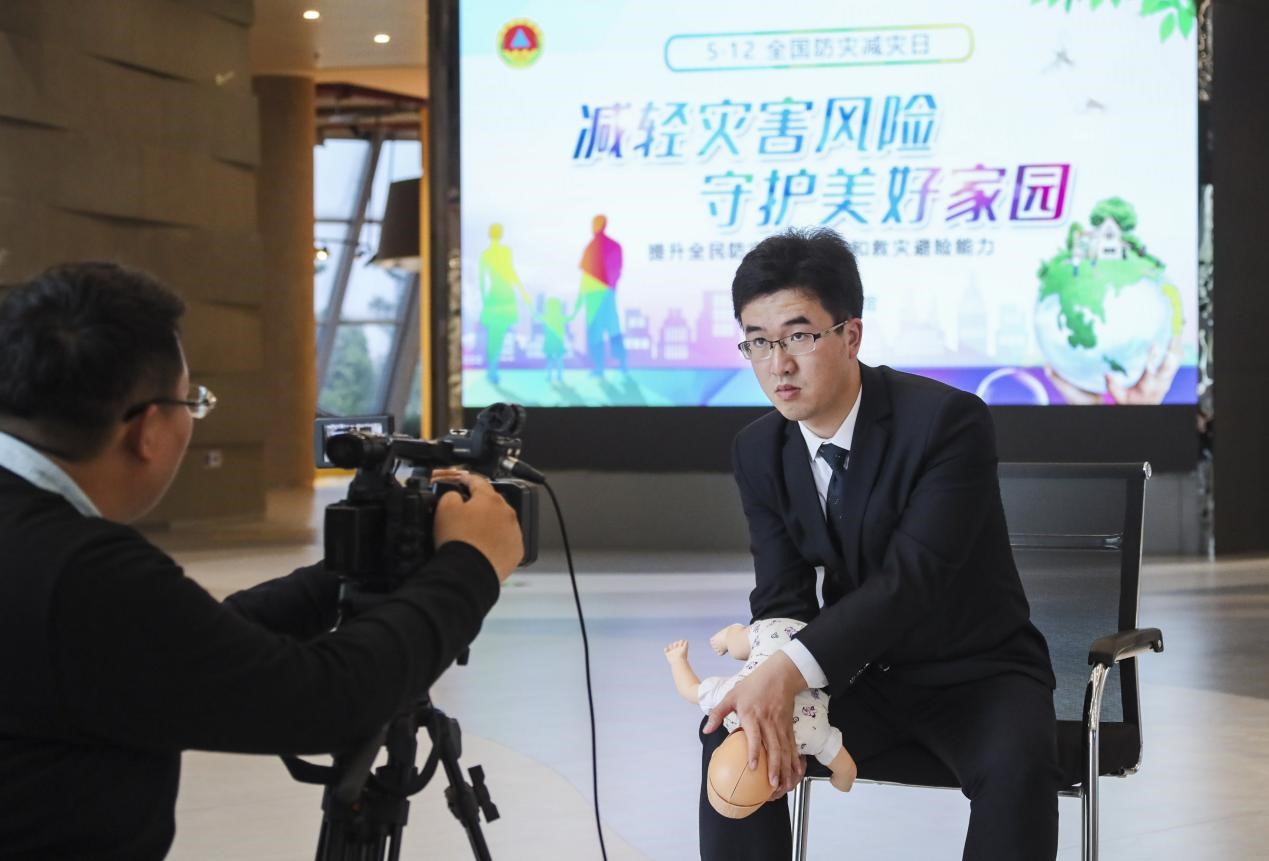Online knowledge sharing on the rise in China
In China, more and more teachers and content creators are sharing online.
They give virtual lessons to internet users on online platforms, explaining the profound in accessible ways, which effectively facilitates the dissemination of knowledge.
Song Hao, associate professor with the School of Mathematics and Quantitative Economics, Shandong University of Finance and Economics, has uploaded a 154-episode online course on advanced mathematics onto an online platform. The course, which lasts a total of over 76 hours, has garnered more than 110 million views and nearly 2.34 million bullet-screen comments.

Retired Chinese language teacher Yang Weiyun teaches Chinese pinyin online. (Photo: screenshot of Yang Weiyun's livestream)
Each episode of the course is often watched by hundreds of people simultaneously in real-time. Comments of encouragement continue to appear on the bullet screen.
Speaking of how he became a "knowledge sharer" on the internet, Song told People's Daily that he started all this just to help students who asked him for help to learn the course of linear algebra.
Over the past nine years, his teaching equipment has become more and more professional, from a voice recorder in the beginning, to a second-hand digital video recorder, and to an HD camera and a handwriting screen.
Besides, his teaching content also gradually expanded. Online learners could follow him as he taught university mathematics subjects including linear algebra, calculus, probability theory and mathematical statistics.
"Nowadays, many middle school teachers have opened accounts on short video platforms, where they explain various subjects through videos. These lessons are visually appealing and interesting, attracting many followers," said a woman surnamed Yang, who lives in Haidian district, Beijing, adding that she and her child watch short videos about physics and chemistry every day.
A middle school physics teacher in Fushun, northeast China's Liaoning province, is a popular content creator on Douyin, the Chinese version of TikTok. He has a characteristic bald look, much like a famous Chinese cartoon character.

Zhang Chenliang (left), director of the media center of Chinese National Geography magazine, films a documentary about plants in northwest China's Xinjiang Uygur autonomous region. (Photo from Zhang Chenliang's account on the social media platform Weibo)
He films physics experiments conducted in the classroom, which not only explains physical principles in just dozens of seconds, but also relates them to philosophy of life. His unique approach has gained him over 3 million followers.
In addition to school teachers, there are many professional institutions and science popularizers spreading knowledge and answering netizens' questions online.
It has already become a routine for many short video users to watch the witty and lively science popularization videos by the Institute of Physics, Chinese Academy of Sciences. They also attend the diverse live open lectures of various universities, join virtual tours of the Palace Museum which boasts rich historical collections, and listen to doctors or book bloggers sharing their experiences.
According to statistics, the number of knowledge-sharing content creators with over 10,000 followers on Douyin had exceeded 500,000 as of October 2022, increasing by 69.6 percent year-on-year. In particular, knowledge sharing of life, culture, popular science, and machinery, as well as technology product introduction, were sectors that saw a fast increase.
Zhang Chenliang, director of the media center of Chinese National Geography magazine, has garnered a total of over 35 million followers on various online platforms. His video series of creature identification has been played 1.77 billion times on Douyin.
In these videos, he not only shares knowledge of fantastic creatures that are popular online, but also answers questions from netizens. Many people have learned about biological knowledge by watching his videos.

An employee of the civil defense museum in Huai'an, east China's Jiangsu province, teaches Heimlich maneuver, or abdominal thrusts, through livestreaming. (People's Daily Online/Zhao Qirui)
Among the many knowledge-sharing influencers, there is a special group of retired workers. Although they have left their previous careers, they continue to shine on internet platforms, passing on what they have learned throughout their lives.
Yang Weiyun, 74, is a retired Chinese language teacher at an elementary school in Huainan, east China's Anhui province. She has spent most of her life teaching children how to pronounce and recognize characters.
Since 2021, she started teaching Chinese pinyin, or the phonetic alphabet, on online platforms. Many people are learning pinyin, the Three Character Classic and ancient poems from her.
The livestream of Wang Guangjie, an 82-year-old retired electrician teacher, was often watched by many who are interested in electronic circuits. The highest number of viewers in a single stream exceeded 400,000.
When encountering questions from the viewers that he cannot answer, Wang would consult experienced electricians or graduate students watching the stream and invite them to share their ideas.
Experts believe that short videos and livestream can promote sharing and co-creation. Platform operators and knowledge-sharing influencers should collaborate to expand the channels for knowledge dissemination and improve the environment for knowledge sharing, so as to provide users with a wider range of choices through high-quality videos.
Photos
Related Stories
- Village officials help increase income by promoting tea leaves through livestreams
- Livestream shows in factories boost sales, facilitate recruitment in China
- China sees prosperous development of internet audio-and-video industry
- Chinese online retail markets attract young Namibians to start businesses
- Education firm finds fortunes via livestream
Copyright © 2023 People's Daily Online. All Rights Reserved.









